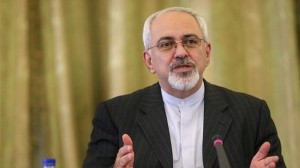 TEHRAN (Tasnim) � Foreign Minister Mohammad Javad Zarif, who is also the country's top negotiator, called for national consensus as he prepares to lead Iranian delegation in next week talks between Tehran and the six world powers.
TEHRAN (Tasnim) � Foreign Minister Mohammad Javad Zarif, who is also the country's top negotiator, called for national consensus as he prepares to lead Iranian delegation in next week talks between Tehran and the six world powers.�A great job awaits us next week, and it needs internal consensus and national rapport more than anything,� Zarif said in a message posted on his Facebook page on Friday.
The minister also noted that he is busy with the preparatory work to get ready for the forthcoming meeting in the next few days.
Top diplomats from Iran and the G5+1, also known as P5+1, which includes the five permanent members of the UN security Council as well as Germany are to meet in Geneva on October 15 and 16 to discuss Iran's nuclear program.
Zarif had announced earlier that world powers negotiating with Tehran over its nuclear program must come up with new proposals before talks in Geneva.
"The previous P5+1 plan given to Iran belongs to history and they must enter talks with a new point of view," he said last week.
Meantime, Iranian Parliament Speaker Ali Larijani on October 8, once again called on the West to accept Iran�s right to enrich uranium for civilian purposes, as allowed under the Non-Proliferation Treaty (NPT), to which Iran is a signatory.
He said Iran is serious about resolving the dispute over its nuclear program, and is keen to resolve the issue in a short period of time.
�From Iran's side, I can say that we are ready,� Larijani told CNN�s Christiane Amanpour on Tuesday.
�If the Americans and other countries say that Iran should not develop a nuclear bomb or should not move towards that,� he told Amanpour, �then we can clearly show and prove that. We have no such intention. So it can be resolved in a very short period of time.�
The United States and the European Union have imposed illegal unilateral sanctions against Iran under the pretext that Iran's nuclear energy program may include a military component.
Iran rejects the allegation, arguing that numerous inspections of its nuclear sites by the International Atomic Energy Agency (IAEA) have invariably failed to find any diversion towards military purposes.
By Tasnim News Agency
The Iran Project is not responsible for the content of quoted articles.










